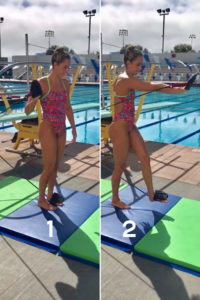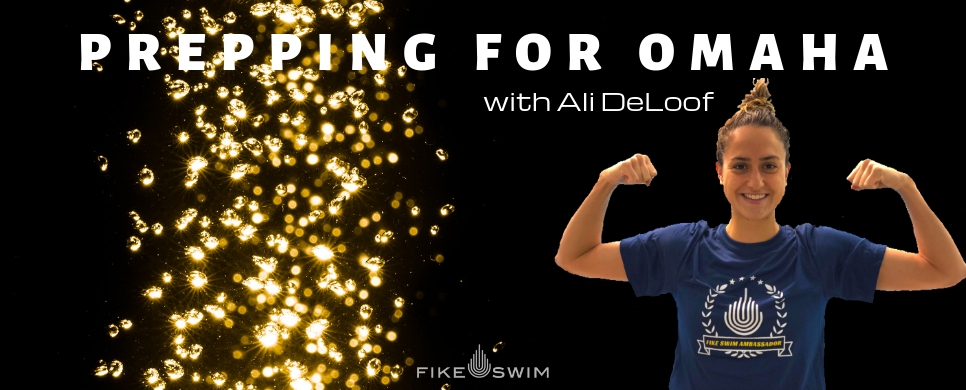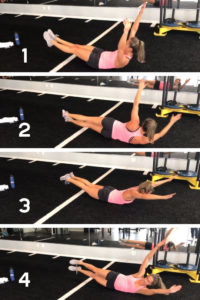About Prepping for Omaha
The “Prepping for Omaha” series looks at Fike Swim ambassadors in the run up to Trials and the preparations they are making to earn the most coveted spot in sports- a place on the U.S. Olympic Team. Our first edition looks at elite backstroker Ali DeLoof and the major stroke changes she has been working on.
Ali has enjoyed enormous success over the last few years, with a resume that would make most swimmers envious. She held the American Record in the 50 Back (SCM) and the World Record in the 200 Medley Relay (SCM). She was on the National Team, traveling to World University Games in 2017 where she won gold. NCAA All-American at one of the best swim schools in the country (Michigan) and the list goes on.
But when she missed making the 2018-2019 National Team with less than two years until Olympic Trials, Ali decided to change things up and swim different (see what we did there? :). She made the difficult decision to move away from Michigan, her home for the last six years where she trained with her three sisters, to Team Elite in California. And she devoted herself to changes in her stroke that she hoped would improve her efficiency, power, and speed, a scary endeavor when you’ve done something the same way for so long and you’re so close to Trials.
Here’s what the Pan Ams gold medalist has been working on:
1. Consistently High Tempo
Every distance requires a different tempo, or the measure of time it takes you to complete one stroke cycle. In freestyle and backstroke the stroke cycle is the completion of one left arm pull and recovery and one right arm pull and recovery. Ali has been working to get to a consistent 1.2 (1 stroke cycle in 1.2 seconds). In the past, she has been inconsistent, starting a 100 back at 1.1 to 1.3 then falling to 1.5 in the last 15 meters. That may not sound like a big deal but at her level it can be the difference between the Olympic Team and third place. Ali has improved her tempo by:
- Swimming with a tempo trainer;
- Pulling more shallowly which flattens her a bit but gets her through her pull quicker;
- Swimming tethered to the wall under a diving board that has a mirror under it so she can check that her arms do not cross her midline. This ensures her arms take a straight path through the recovery phase;
- 25s fast with an ankle strap; and
- LOTS of grueling race pace sets.
https://www.youtube.com/watch?v=-gacJ5uvN0E&feature=youtu.be
https://www.youtube.com/watch?v=m9Dg4shHU4o&feature=youtu.be
2. Better Timing
Every stroke has “timing”, or how a swimmer syncs their pulls, kicks, breath, and, in the case of free and back, rotation. It can be hard to sync the kicks in free and back because the legs are firing so quickly and with such short movements, but getting it right creates a powerful synergy across your body.  Ali noticed a weak connection between the finishing pull of her right arm and the top of her catch with her left arm, driven mainly by a deeper catch on her left side; her left leg not kicking at the right time to help drive her onto her right side and vice versa; and a weak core that was not engaged in driving her arm and leg movements. To address these, Ali has done the following:
Ali noticed a weak connection between the finishing pull of her right arm and the top of her catch with her left arm, driven mainly by a deeper catch on her left side; her left leg not kicking at the right time to help drive her onto her right side and vice versa; and a weak core that was not engaged in driving her arm and leg movements. To address these, Ali has done the following:
- To fix the uneven catch, Ali focuses on shallower pulls with her left arm, which also helps improve her tempo;
- To help sync her pulls, kicks, and rotation, she does the activation exercises like the ones to the right before every practice; and
- Shifting to a 3-beat kick with the 3rd kick helping to rotate into the next stroke.
3. Core Engagement
At the heart of everything she was trying to fix was a weak core that was not engaged in driving her backstroke. Core is critical and swimmers often don’t engage it as much as we should. Ali did these exercises on land to strengthen her core:
Ali wasn’t thrilled with her Pan Ams performance- her goal was :59 in the 100 back and she went 1:01. But she is still in the middle of overhauling her stroke, and best times are hard to come by when you’re adjusting to a new stroke. “I would say I’m about 80-85% there,” said Ali. “Yes I am super bummed about my performance at Pan Ams but I am ready to make changes and work on my endurance to help with my backstroke.” Nothing feels so good as a stroke that comes together and with about 10 months to go you can be sure Ali will get that last 20% and be a force in Omaha.
You can support Ali on her journey to Tokyo by following her Instagram and Facebook pages, and you can get the latest Fike Swim news, product updates, and videos by liking them on Facebook and subscribing to their YouTube channel. And you can get a candid look at Fike Swim’s journey to help swimmers SWIM DIFFERENT by following them on Instagram.
About Fike Swim
“We design products exclusively for the toughest sport in the world. We unapologetically place swimmers on a pedestal. The rigors they embrace on a daily basis can only be understood by another swimmer and they deserve a company focused 100% on helping them succeed. Whether you’re just starting out or training for Tokyo, we stand behind you.”
– James Fike, Founder
Fike Swim Products was born when founder James Fike put a brick on top of a kickboard and transformed just another legs-only kick set into a total body workout felt into the next day. Since then it’s been our mission to create unique swim equipment with the single-minded goal of making you faster. We don’t sell toys. We create tools to help you reach your potential.
Swimming news is courtesy of Fike Swim, a SwimSwam partner.



Backstroke going to be so tough to make Oly team in 2020. – She would haveto drop major time time to be in the top 2 discussion. Hope this stroke change helps, although it seems like she swam better times when she was training at MI?
Love the details!